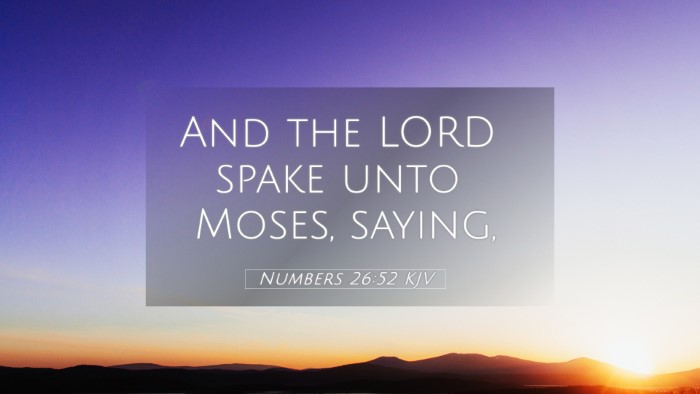Understanding Numbers 26:52
Numbers 26:52 states: "And the Lord spake unto Moses, saying,
This verse is situated within the context of the Israelite census, which outlines the divisions of the land among the tribes of Israel following their wanderings in the wilderness.
Commentary Insights
Matthew Henry's Commentary
Henry emphasizes the importance of divine communication in this verse. The phrase "And the Lord spake" indicates that God is providing critical instructions about the distribution of the land. This depicts God's sovereignty and authority over Israel's future. Moreover, Henry points out that the fairness in apportioning the land serves to signify God's justice, as He gives each tribe their rightful place based on their size.
Albert Barnes' Commentary
Barnes elaborates on the notion that this command from God is significant for understanding the relationship between the people and their promised land. He indicates that the instructions are purposeful, providing a systematic approach to settling the Israelites into their respective territories. This reflects how God meticulously cares for His people's needs and ensures everyone has a portion within the community.
Adam Clarke's Commentary
Clarke discusses the implications of the inheritance of the land. He connects this back to the covenant God made with Abraham about his descendants inheriting the land. Clarke notes that the emphasis on each tribe receiving a specific area underlines God's promise and faithfulness. This inheritance is not merely a physical possession but serves as a reminder of God's everlasting commitment to His covenant people.
Cross-References and Thematic Connections
Understanding Numbers 26:52 involves recognizing its interrelations with other scriptures. Here are several key cross-references:
- Joshua 14:1-2 - This speaks of the division of lands among the tribes of Israel, resonating with the themes in Numbers 26:52.
- Deuteronomy 1:35-36 - This reinforces the idea of the land inheritance based on God's promises to the generations of Israel.
- Ezekiel 48:1-29 - Presents the vision of the future division of land among the tribes, connecting Old Testament promises with future fulfillment.
- Hebrews 11:9-10 - Refers to the faith of Abraham and his descendants, highlighting theland promises and God's eternal city.
- Psalm 78:55 - Mentions God driving out nations and settling Israel into their inheritance, thus connecting the message of Numbers.
- Acts 7:5 - Reference to Abraham's promise of inheritance, echoing the themes found in Numbers 26.
- Galatians 3:29 - Discusses believers as heirs according to the promise, drawing a line from ancient Israel to the Christian faith.
- Revelation 21:3-4 - Points to the ultimate fulfillment of God's promises, connecting the land inheritance theme through the ages.
- Matthew 5:5 - "Blessed are the meek, for they shall inherit the earth," which relates to those who follow God’s ways.
- Romans 4:13 - Discusses the promise to Abraham and his descendants concerning the world, tying to the land inheritance in Numbers.
Theological Implications
Numbers 26:52 and its surrounding passages underscore several theological themes:
- Divine Authority: God’s voice in present circumstances can guide and direct humanity.
- Covenant Faithfulness: The emphasis on inheritance shows God's unchanging commitment to His people.
- Community and Fairness: The equitable division of land speaks to God’s justice and the importance of communal life.
- Fulfillment of Promises: Echoes the prophetic future, revealing God’s plans for both Israel and the Church.
Conclusion
In summary, Numbers 26:52 serves not only as a historical account of Israel's journey but also as a foundational scripture that resonates through the entirety of the Bible. It reveals the necessity of understanding God's sovereign will and His promises throughout history, inviting believers today to reflect on His continuing faithfulness. By cross-referencing relevant biblical texts, deeper insights into the connections between Old and New Testament themes can be gleaned, enhancing personal and communal faith journeys.


